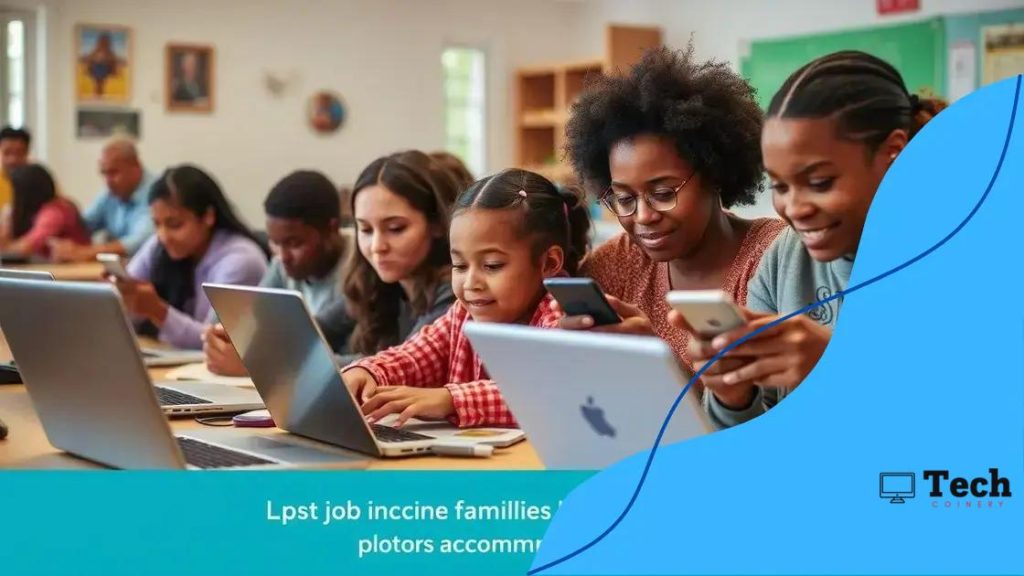Internet access benefit for low-income families

Internet access benefits low-income families by enhancing education, increasing job opportunities, and connecting them to essential resources, ultimately promoting economic stability and improved quality of life.
Internet access benefit for low-income families can change lives by providing vital tools for education and employment. Have you ever considered how these advantages impact opportunities and connections for families in need?
Improving education through reliable internet access
Having reliable internet access can greatly enhance education for low-income families. With the right tools, children can learn more effectively and expand their knowledge. An internet connection opens the door to various resources like online tutoring, educational videos, and interactive learning platforms.
Benefits of online learning resources
Many families do not realize the magnitude of educational options available online. Here are some key benefits:
- Accessibility: Children can access learning materials from anywhere and at any time.
- Diverse learning methods: Online resources cater to different learning styles, making education more engaging.
- Additional support: Students can find help through online tutoring, which is often more accessible than traditional methods.
Furthermore, schools are increasingly incorporating technology into their curricula. With a reliable internet connection, students can participate in virtual classrooms, collaborate on projects with peers, and access a wealth of information directly. This availability encourages self-directed learning, promoting independence.
Community involvement and resources
Local community programs often play a part in boosting internet connectivity. They provide necessary support and resources to families who might be struggling. Programs that offer affordable internet plans or free access points are essential in bridging the gap for low-income households.
Moreover, parents can enhance their involvement in their children’s education through online platforms. By staying connected, they can monitor progress, attend virtual meetings, and access school updates. This involvement is crucial for sustained educational success and can build a strong support network within the community.
In essence, reliable internet access does more than just connect families to the world; it transforms their educational landscape, offering incredible opportunities for growth and development. This widely accessible tool for learning is pivotal in helping students achieve their full potential.
Enhancing job opportunities for low-income families
Enhancing job opportunities for low-income families is crucial in today’s digital age. Reliable internet access can transform job searches, making them more efficient and accessible. Families can explore various employment options from the comfort of their homes.
Access to online job platforms
Many families may not realize the potential that online job platforms hold. These platforms allow users to:
- Search for jobs: Browse countless job listings tailored to various skills and experiences.
- Submit applications: Easily apply for multiple positions with just a few clicks.
- Networking: Connect with employers and fellow job seekers.
By utilizing these platforms, families can access opportunities that were once out of reach due to geographical limitations. This convenience is invaluable for those balancing work and family responsibilities.
Workshops and online training
In addition to job searching, many organizations offer free workshops and training courses online. These resources empower individuals to improve their skills and enhance their resumes. Families can benefit from:
- Skill development: Learn new tools and technologies that are in demand.
- Certification programs: Obtain certifications that increase employability.
- Flexible schedules: Participate in training sessions that fit into busy lifestyles.
Equipped with enhanced skills, individuals are better positioned to pursue job opportunities. They can also stand out in a competitive job market. Furthermore, online resources provide access to job fairs and recruitment events, facilitating direct connections with potential employers.
For many low-income families, the journey to better employment begins with having a reliable internet connection. This vital tool not only opens doors to job opportunities but also cultivates personal and professional growth. By leveraging available resources, families can work towards improved financial stability and a brighter future.
Connecting families to essential resources online

Connecting families to essential resources online can significantly improve their quality of life. Reliable internet access enables families to find vital information and support systems that can aid in their everyday challenges.
Accessing Community Services
Many community services have transitioned online, making it easier for families to locate the help they need. With a few clicks, families can:
- Locate food assistance: Find local food banks and nutritional programs.
- Apply for benefits: Navigate through government websites for food stamps or housing assistance.
- Connect with healthcare providers: Access telehealth services for medical advice or check-ups.
This shift allows families to seek assistance without the barriers of transportation or scheduling conflicts, promoting self-sufficiency and well-being.
Educational and Online Learning Resources
In addition to immediate services, families can access a wealth of educational resources. Websites offer free tutorials, classes, and educational materials for all ages. Parents can find information on:
- Home schooling resources: Materials to help educate children at home.
- Scholarships and grants: Opportunities for further education and skill development.
- Parenting workshops: Online sessions to support and guide parents in their roles.
This access empowers families not just to survive but to thrive, fostering a learning environment at home. Many platforms offer forums where families can share experiences and resources, building supportive communities.
Ultimately, the internet serves as a bridge to essential resources that can uplift and sustain low-income families. By ensuring that connectivity reaches those in need, we pave the way for brighter outcomes.
The role of community programs in providing internet access
The role of community programs in providing internet access is pivotal, especially for low-income families. These programs are designed to bridge the digital divide, ensuring that everyone has the chance to connect.
Local initiatives and partnerships
Many community organizations work hard to increase access to reliable internet. They collaborate with local governments, schools, and businesses to achieve results. Some key efforts include:
- Free Wi-Fi hotspots: Establishing free internet access points in community centers, libraries, and parks.
- Affordable internet plans: Negotiating with ISPs to offer low-cost internet packages for families in need.
- Digital literacy training: Teaching families how to use the internet safely and effectively.
These initiatives equip families with the tools they need to succeed in a digital world. As a result, families can access information, apply for jobs, and participate in online education.
Empowerment through technology
Community programs also empower residents by fostering technological proficiency. Workshops and training sessions focus on various skills. These skills may include:
- Basic computer skills: Teaching how to navigate the internet, use email, and conduct searches.
- Professional development: Providing resources for résumé writing and interview preparation.
- Online safety practices: Educating families about privacy and security issues.
Through these educational efforts, families become more comfortable with technology and more capable of leveraging online resources. This empowerment is essential for creating equal opportunities in today’s job market.
In essence, community programs play a crucial role in connecting families to the internet. They not only provide access but also support the development of vital skills. By investing in these services, communities can enhance the lives of low-income families.
Long-term impacts of internet access on low-income households
The long-term impacts of internet access on low-income households are profound and wide-reaching. When families gain reliable internet, they unlock new avenues for improvement in various aspects of their lives.
Education and skill development
Access to the internet allows children and adults alike to engage in continuous learning. Families can benefit from:
- Online courses: Many platforms offer free or low-cost courses that help individuals gain valuable skills.
- Tutoring services: Parents can find online tutors to assist their children in challenging subjects.
- Research capabilities: Students can conduct research for homework and projects more efficiently.
This focus on education can lead to better job prospects and a more educated generation. As children perform better in school, the cycle of poverty can start to diminish.
Economic stability
Moreover, internet access contributes to economic stability within low-income households. With reliable internet, families can:
- Access remote job opportunities: Many companies now offer flexible work arrangements that can suit various lifestyles.
- Improve household finances: Families learn to manage budgets and find deals through online resources.
- Connect with local services: Easy access to community resources helps families utilize available assistance programs.
Over time, these opportunities can help break the cycle of poverty. When families improve their financial status, they often invest in health and education, leading to a better quality of life.
In addition to education and financial benefits, the internet can foster social connections. Families can maintain relationships with friends and relatives, reducing feelings of isolation. This support network is essential for mental well-being.
Ultimately, the impacts of internet access on low-income households are significant. By bridging the digital divide, communities can empower families to achieve greater social and economic success.
FAQ – Frequently Asked Questions about Internet Access for Low-Income Families
How does internet access benefit low-income families?
Internet access improves education, job opportunities, and connects families to essential resources that support their daily lives.
What community programs support internet access for families?
Many community organizations partner with local governments and businesses to provide free Wi-Fi, affordable plans, and digital literacy training.
Can reliable internet help with job searching?
Yes, reliable internet allows families to explore job listings, apply for positions easily, and access online training to improve their skills.
What long-term benefits does internet access provide?
Long-term benefits include better educational outcomes, increased economic stability, improved social connections, and overall enhanced well-being for families.






